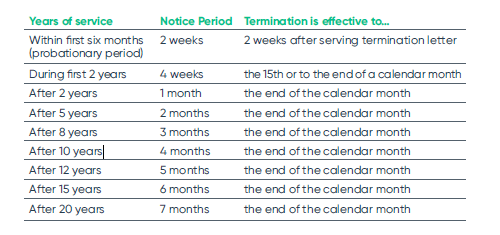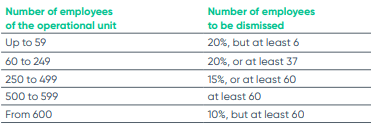- Home
- News & insights
- Insights
- Dismissal law and te…
- 在此页面上
2022年12月12日
Dismissal law and termination procedure under German law
- In-depth analysis
Dismissal law
Under German law, the employment relationship can be terminated by mutual agreement, by expiration of a fixed-term contract, or by notice given by one of the contracting parties. Protection against dismissal is divided into general and special protection.
The freedom of the employer to dismiss an employee is mainly governed by the German Civil Code (Bürgerliches Gesetzbuch – “BGB”) and the German Act Against Unfair Dismissal (Kündigungsschutzgesetz – “KSchG”). German labor and employment law sets high standards for the employer to unilaterally terminate an employment relationship. Especially the application of the KSchG has a strong impact on the dismissal of employees. The act applies if
- an employer generally employs more than ten employees and
- the employee has worked in the same company or business establishment for six months without interruption.
If the KSchG applies, a notice of termination is only legally effective if it is “socially justified”. Pursuant to sec. 1 KSchG, a termination is only justified if it is based on reasons related to
- the person
- or the conduct of the employee, or
- compelling operational requirements which preclude the continued employment of the employee in the establishment.
Person-related reasons particularly include physical or mental impairments, extensive absenteeism due to illness, and reduced working capacity. A dismissal based on the employee’s conduct usually requires that an advance warning letter (Abmahnung) has been given to the employee. Conduct-related reasons include a willful or severely negligent breach of contract. In terms of operational reasons, the employer must prove that the employee’s dismissal was necessary for compelling business reasons, such as reorganization. These measures (written down in a business decision of the management) must result in the loss of the position and there may not be any alternative positions available for the employee to occupy. Furthermore, dismissals due to business reorganization are only socially justified if the correct “social” criteria have been applied.
Among employees having comparable personal and technical qualifications and working in similar jobs, the employer must select the employee with the weakest social standing based on several criteria including age, length of service, support obligations for dependents, and severe disability (so-called “social selection” – Sozialauswahl).
In the case of severe breaches of duty, the employment relationship can also be terminated for cause with immediate effect by either party without observing a notice period. Among the very rare valid reasons for immediate termination are e.g. crimes against the employer. The employer must provide notice within two weeks after becoming aware of the relevant circumstances.
If the KSchG does not apply, no reason for dismissal is needed. The dismissal however needs to be in line with the applicable notice period and comply with the principles of good faith and good morals.
Special protection is provided to employees who generally face a greater risk of dismissals such as handicapped or pregnant employees and members of the works council. Disabled or pregnant employees as well as employees on parental leave enjoy special protection. In such cases, the permission of relevant government authorities is required prior to issuing a dismissal. Furthermore, members of the works council can only be dismissed in the case of prior approval of the works council.
Ordinary dismissals are subject to certain periods of notice. Notice periods are stipulated by law. The minimum statutory notice period for both the employer and the employee following a probationary period is four weeks counting back from the 15th or the last day of a calendar month (sec. 622 BGB). However, the notice period for the employer gradually increases with the amount of company seniority of the employee:

Individual contracts of employment may only specify longer notice periods. Collective bargaining agreements, on the other hand, may deviate from the statutory notice periods in the employees’ favor as well as to their disadvantage.
In case of a mass dismissal, the employer has to notify the local office of the employment agency prior to dismissing employees in accordance with sec. 17 KSchG, if he dismisses within the next 30 calendar days in operations
- with more than 20 and less than 60 employees more than 5 employees;
- with at least 60 and less than 500 employees at least 10% of the employees or more than 25 employees.
- with at least 500 employees and more at least 30 employees.
A notice of termination without correct and prior notification of the employment agency is null and void.
Dismissal
If a works council exists, employers must be aware that the works council must be consulted before each dismissal. Even though the works council cannot prevent a dismissal, the dismissal is invalid if the employer fails to properly inform and consult the works council beforehand according to sec. 102 German Works Constitution Act (Betriebsverfassungsgesetz – “BetrVG”).
Business reorganization
In companies with more than 20 employees, an existing works council must also be involved in the event of a reorganization of the business (e.g. closure of operation or in the event of a mass dismissal). A social plan must be concluded with the works council; however, the obligation to conclude a social plan does not exist during the first four years after the establishment of the company. If the reorganization of the business consists solely of the dismissal of employees, the works council can only enforce a social plan if certain thresholds are exceeded:

In addition, the conclusion of a reconciliation of interests must at least be attempted (sec. 111, 112 BetrVG). If a reconciliation of interests is not attempted, the employer risks claims for compensation for disadvantages of the affected employees (usually claims for severance pay).
Dismissal protection claim
If the employee believes that a dismissal is invalid, he or she must file a claim at the employment court and apply for a declaration that the employment relationship has not ended (Kündigungsschutzklage).
Once a dismissal has been issued, out-of-court negotiations tend not to be successful since the employee who wishes to invoke protection against dismissal must file a complaint with the labour court within three weeks. That means that there is considerable time pressure. If the three-week period is not observed, the dismissal is deemed to be valid.
Dismissal proceedings are initiated with the conciliation hearing. This hearing is not held before the full panel of judges in the chamber, but only before the presiding judge. The primary goal of the conciliation hearing is to come to an amicable settlement. Both parties should make careful preparations for the conclusion of a settlement in a conciliation hearing. Ift this hearing is unsuccessful, it will be followed by another hearing. In practice, this generally means that a new court date will be scheduled and legal briefs will have to be submitted in preparation of the hearing. If the parties are unable to come to a mutual agreement the court must determine whether the dismissal was valid.
German employment law does not provide for the termination of the employment relationship in return for the payment of severance. However, more than 85% of the lawsuits against dismissals are settled against payment of severance. The amount of such severance is usually calculated as half of the gross monthly salary per year of employment, as a rule of thumb, but can be lower or higher, depending on the employee’s chances of success in a possible lawsuit.
Termination Agreement
Due to the high standards of protection against dismissal, it is not uncommon for the employment relationship to be terminated by contract between the employer and employee, i.e. a termination agreement. This may occur at any time with or without a severance payment. The provisions on protection against dismissal do not apply in such cases. Even employees enjoying special protection against dismissal may conclude a termination agreement without requiring the permission of the authorities. The employer will generally offer a severance payment to induce employees to accept a termination by mutual agreement.
Issuing a notice letter the right way
The notice letter must be printed on the letterhead of the company. If the text comes on two pages, the first page should be initialed in the corner of the bottom of the page. The printout of the notice letter has to be signed by a person who is authorized to represent the company by its sole signature. Therefore, such person must sign the printout (hardcopy) of the notice letter (wet-signature, no scanned signature, no stamp, no copy or DocuSign, etc.). Under German law, the employee would be entitled to reject the notice letter if it is only signed by someone who is not entitled to represent the company, unless a valid original power of attorney is handed out to the employee together with the notice letter. The company should make one copy of the signed notice letter for its files. Another copy of the signed termination should be prepared and should be attached to the receipt of acknowledgement.
The original of the signed notice letter must be duly delivered to the respective employee. Due delivery means that the original of the signed German hardcopy document is delivered; delivery of a photocopy, a fax, or a PDF sent via mail would not be considered a due delivery. The original of the signed notice letter should be handed over with one witness to the employee personally, if possible. The delivering person should ask the employee to sign the acknowledgement of receipt of one original version. If the employee refuses to sign, the delivering person would still hand out the notice letter and could later act as a witness for the due delivery. He or she should make a note for the files when and how the delivery has taken place. If a personal hand-over is not possible, the company can either use a messenger (Bote) who puts the notice letter in the mailbox and confirms the delivery (the time when the termination was put in the mailbox and name of the messenger) or the German mail service (in this case the notice letter should be sent in the form of an “Einwurf-Einschreiben”, but definitely not as “Einschreiben mit Rückschein”, so that the German mail service will render a confirmation about the delivery to the company.






